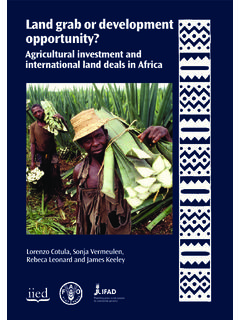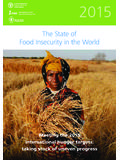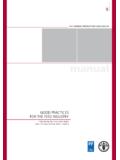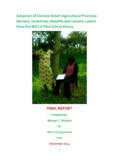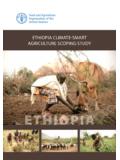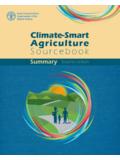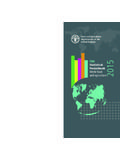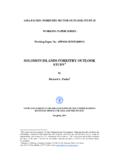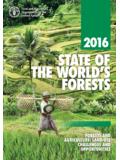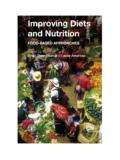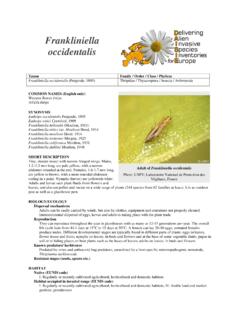Transcription of AGRO INDUSTRIES FOR EVELOPMENT - Food and …
1 agro - INDUSTRIES FOR DEVELOPMENT. agro - INDUSTRIES FOR. DEVELOPMENT. Edited by Carlos A. da Silva Doyle Baker Andrew W. Shepherd Chakib Jenane and Sergio Miranda-da-Cruz Published by The Food and Agriculture Organization of the United Nations and The United Nations Industrial Development Organization by arrangement with cab international cabi is a trading name of cab international cabi Head Office CABI North American Office Nosworthy Way 875 Massachusetts Avenue Wallingford 7th Floor Oxfordshire OX10 8DE Cambridge, MA 02139. UK USA. Tel: +44 (0)1491 832111 Tel: +1 617 395 4056. Fax: +44 (0)1491 833508 Fax: +1 617 354 6875. E-mail: E-mail: Website: FAO and UNIDO 2009. All rights reserved. Reproduction and dissemination of material in this informa- tion product for educational or other non-commercial purposes are authorized without any prior written permission from the copyright holders provided the source is fully acknowledged.
2 Reproduction of material in this information product for resale or other commercial purposes is prohibited without written permis- sion of the copyright holders. Applications for such permission should be addressed to the Chief, Electronic Publishing Policy and Support Brance, Information Division, FAO, Viale delle Terme di Caracalla, 00100. Rome, Italy or by email to A catalogue record for this book is available from the British Library, London, UK. Library of Congress Cataloging-in-Publication Data agro - INDUSTRIES for development / edited by Carlos A. da Silva .. [et al.]. p. cm. Includes bibliographical references and index. ISBN 978-1-84593-576-4 (hardback : alk. paper) -- ISBN 978-1-84593-577-1 (pbk.)
3 : alk. paper). 1. Agricultural INDUSTRIES --Developing countries. 2. Agriculture--Economic aspects--Developing countries. 3. Economic development--Developing countries. 4. Competition--Developing countries. I. Da Silva, Carlos A. II. Title. 2009. '4 dc22. 2009006652. Published jointly by CAB international and FAO. Food and Agriculture Organization of the United Nations (FAO) Viale delle Terme di Caracalla, 00153 Rome, Italy. Website: ISBN: 978 1 84593 576 4 (CABI hardback edition). ISBN: 978 1 84593 577 1 (CABI paperback edition). ISBN: 978 92 5 106244 9 (FAO hardback edition). ISBN: 978 92 5 106019 9 (FAO paperback edition). The designations employed and the presentation of material in this publication do not imply the expression of any opinion whatsoever on the part of the Food and Agriculture Organization of the United Nations (FAO) or of the United Nations Industrial Development Organization (UNIDO) concerning legal status of any country, territory, city or area or of its authorities, or concerning the delimitation of its frontiers or boundaries.
4 The mention of specific companies or products of manufacturers, whether or not these have been patented, does not imply that these have been endorsed or recommended by FAO or UNIDO in preference to others of a similar nature that are not mentioned. The views expressed herein are those of the authors and do not necessarily represent those of the FAO or UNIDO. Typeset by SPi, Pondicherry, India. Printed and bound in the UK by the MPG Books Group, Bodmin. The paper used for the text pages in this book is FSC certified. The FSC (Forest Stewardship Council) is an international network to promote responsible management of the world's forests. Contents Contributors vii Foreword ix Acknowledgements xi 1. Introduction 1.
5 Carlos A. da Silva and Doyle Baker 2. Building the Political Case for agro - INDUSTRIES and 10. Agribusiness in Developing Countries Spencer Henson and John Cranfield 3. agro -industry Trends, Patterns and Development Impacts 46. John Wilkinson and Rudi Rocha 4. Technologies Shaping the Future 92. Colin Dennis, Jos Miguel Aguilera and Morton Satin 5. Enabling Environments for Competitive agro - INDUSTRIES 136. Ralph Christy, Edward Mabaya, Norbert Wilson, Emelly Mutambatsere and Nomathemba Mhlanga 6. Business Models That Are Inclusive of Small Farmers 186. Bill Vorley, Mark Lundy and James MacGregor v vi Contents 7. Corporate Social Responsibility for 223. agro - INDUSTRIES Development Claudia Genier, Mike Stamp and Marc Pfitzer 8.
6 Annex: Agriculture for Development Implications 252. for agro - INDUSTRIES Alain de Janvry Index 271. Contributors Jos Miguel Aguilera, Professor, Department of Chemical Engineering, Universidad Cat lica de Chile, Santiago, Chile Doyle Baker, Chief, Rural Infrastructure and agro - INDUSTRIES Division, Food and Agriculture Organization of the United Nations, Rome, Italy Ralph Christy, Professor, Department of Applied Economics and Management, Cornell University, Ithaca, New York, USA. John Cranfield, Associate Professor, Department of Food, Agricultural and Resource Economics, University of Guelph, Ontario, Canada Carlos A. da Silva, Agribusiness Economist, Rural Infrastructure and agro - INDUSTRIES Division, Food and Agriculture Organization of the United Nations, Rome, Italy Colin Dennis, Director General, Campden BRI, Chipping Campden, Gloucestershire, UK.
7 Claudia Genier, Senior Consultant, FSG Social Impact Advisors, Geneva, Switzerland Spencer Henson, Professor, Department of Food, Agricultural and Resource Economics, University of Guelph, Ontario, Canada Alain de Janvry, Professor, Agriculture and Resource Economics, University of California at Berkeley, USA. Mark Lundy, Agroenterprise Specialist, international Center for Tropical Agriculture (CIAT), Cali, Colombia Edward Mabaya, Researcher Associate, Department of Applied Economics and Management, Cornell University, Ithaca, New York, USA. James MacGregor, Researcher, international Institute for Environment and Development (IIED), London, UK. Nomathemba Mhlanga, PhD Candidate, Department of Applied Economics and Management, Cornell University, Ithaca, New York, USA.
8 Vii viii Contributors Emelly Mutambatsere, Evaluation Analyst, African Development Bank, Tunis, Tunisia Marc Pfitzer, Managing Director, FSG Social Impact Advisors, Geneva, Switzerland Rudi Rocha, PhD Candidate, Department of Economics, Pontif cia Universidade Cat lica do Rio de Janeiro, Brazil Morton Satin, Director of Technical and Regulatory Affairs, Salt Institute, Alexandria, Virginia, USA. Mike Stamp, Consultant, FSG Social Impact Advisors, Geneva, Switzerland Bill Vorley, Head, Sustainable Markets Group, international Institute for Environment and Development (IIED), London, UK. John Wilkinson, Professor and Researcher, CPDA, Universidade Federal Rural do Rio de Janeiro, Brazil Norbert Wilson, Associate Professor, Department of Agricultural Economics, Auburn University, Auburn, Alabama, USA.
9 Foreword Developing competitive agro - INDUSTRIES is crucial for generating employment and income opportunities. It also contributes to enhancing the quality of, and the demand for, farm products. agro - INDUSTRIES have the potential to provide employment for the rural population not only in farming, but also in off-farm activities such as handling, packaging, processing, transporting and marketing of food and agricultural products. There are clear indications that agro - INDUSTRIES are having a significant global impact on economic development and poverty reduction, in both urban and rural communities. However, the full potential of agro - INDUSTRIES as an engine for economic development has not yet been real- ized in many developing countries, especially in Africa.
10 To address these issues, the Food and Agriculture Organization of the United Nations (FAO), the United Nations Industrial Development Organization (UNIDO) and the international Fund for Agricultural Development (IFAD). organized the first Global agro - INDUSTRIES Forum (GAIF) in New Delhi, India, from 8 to11 April 2008. The Forum developed a shared vision on the factors critical to the future development of agro - INDUSTRIES , the key factors affecting their competitiveness, and potential priority action areas. The objectives of the Forum were threefold: to learn lessons from previous efforts and successes to develop competitive agro - INDUSTRIES in the developing world; to ensure stronger collaboration and joint activities among multi-lateral organizations working on agro -industrialization; and to clarify the distinctive roles of the public sector, multi-lateral organizations and the private sector in agro -industrial develop- ment.

